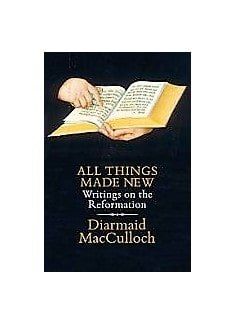There has been a recent flurry of publications on the Reformation. Prior to this, Oxford professor Diarmaid McCulloch stood out in the renewal of Reformation studies. His titles include Thomas Cranmer: a life (1997) and Reformation: Europe’s house divided (2004).
MacCulloch presents a balanced view, linking English Reformers with their continental counterparts, particularly those of Zurich. MacCulloch sees the Reformation in its own terms rather than an idealised, retrospective version. He counters what he calls the ‘dirty little secret of High Church Anglicans’ with the claim that ‘the Church of England, despite many features of which “moderate Puritans” disapproved, was a Reformed Protestant Church to set alongside the churches of Scotland, Geneva, the Netherlands, Hungary or Poland’ (p.250).
The 22 chapters are articles from various published sources over 20 years. It begins with Reformations across Europe, including a chapter on Calvin (afforded a fair deal by the author, bar a couple of asides from a writer who appreciates objectivity more than the Genevan Reformer himself).
The subsequent three-quarters of the collection are devoted to England and its established church, ‘a product of the Reformation, though a peculiar one’ (p.359). It covers the early reforms of Henry VIII to the development of Anglicanism in the late 17th century and beyond. The storyline of the book could well be the destiny of ‘the Eton mess of Anglicanism’ (p.361)!
Failing to become a fully national church because of dissenters, it became an establishment characterised by ‘exhilarating variety, [an] engaging inability to present a single identity and admirable unwillingness to tell people what to do’ (pp. 319-20).
The articles on the Prayer Book and the KJV take some traditional varnish off both. The latter derides ‘King James Version-only’ folk who overlook that it was ‘commissioned by a monarch whose jovial bisexuality would cause them apoplexy at the present day’ (p.181). There are interesting pieces on Henry VIII’s piety, Cranmer and tolerance, Mary and Elizabeth I, and a fascinating look at the Bay Psalm Book — a metrical psalter and the first book printed in New England in 1640.
However, the jewel in the crown is a 40-page essay on ‘Richard Hooker’s reputation’ and the impact of his voluminous Of the lawes of ecclesiastical politie. This article helped me to understand the latitudinarianism of Anglicanism.
MacCulloch’s conclusion hits the nail on the head, focusing on Hooker’s principal concern about what constitutes authority in religion: ‘The disputes which currently wrack Western Christianity are superficially about sexuality, social conduct or leadership style’. But the problem is really elsewhere: ‘The contest for the soul of the church in the West rages around the question of how a Scripture claiming divine revelation relates to those other perennial sources of human revelation, personal and collective consciousness and memory’ (p.319).
This marvellously documented book is impeccably scholarly and its subject matter is in-depth. It is readable, engaging and with flashes of wit. The reader may smile, but will not always agree.
The last page is typically provocative: ‘The Anglican crisis began in 1533, and has not stopped since. That is why it is so satisfying to be an Anglican. Anglicanism is a trial-and-error form of Christianity … an approach to God which acknowledges that he is often good at remaining silent and provoking more questions than answers’ (pp. 361-2).
Yet, what is so satisfying about a trial-and-error form of Christianity? Is not pluralism the only dogma it has left, and one that slides subtly towards new forms of intolerance? Some members of the Anglican community may well think that that is the danger today, and not just in the church, but in this post-truth country at large.
Paul Wells
Liverpool







